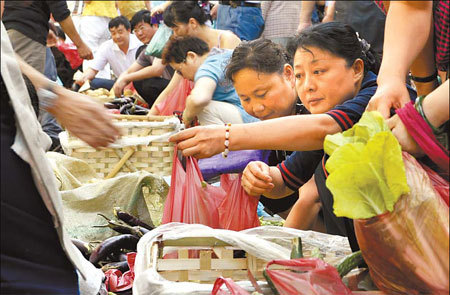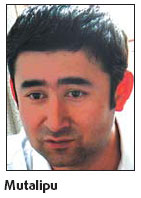 |
|
Urumqi residents buy vegetables at an outdoor market on the Guangming Road yesterday morning. Life is slowly returning to normal. |
Four days after the bloodiest riot in the history of the Xinjiang Uygur autonomous region, Mutalipu, a 34-year-old neurosurgeon at a hospital on the city's Nanhu Street, longs to be home.
It's not that the ethnic Uygur professional doesn't want to do any more brain surgery, and it's not that he's overly tired after four straight days of work. It's not even that he is missing Adina, his wife of four years, any more than usual.
Since Sunday's riot, the 11-year veteran, whose mother, wife and two brothers are all doctors, has been unable to leave the hospital for fear of being caught up in the ethnic violence in this city of more than 2 million and he wants it to end.
"I can't go anywhere," he said. "My looks are a giveaway."
Before the curfew was imposed Tuesday evening and paramilitary forces were mobilized, many local Han people were afraid to be on the streets without a weapon for self-defense.
 Uygur residents, too, were fearful of attacks following Sunday's violence that left at least 156 people dead at the hands of rioters.
Uygur residents, too, were fearful of attacks following Sunday's violence that left at least 156 people dead at the hands of rioters.
Wang Lequan, Xinjiang's chairman, urged ethnic Han residents to remain calm in an unusually emotional televised speech Tuesday afternoon.
"Point the spear toward hostile forces at home and abroad, toward the criminals who took part in attacking, smashing and looting, but don't point it toward our own ethnic brothers," he said.
Emotionally, Mutalipu, who helped treat victims of the Sichuan earthquake last year, said it was difficult to accept anything on the scale of the riots in Urumqi.
"Sure, one would be terrified at some point to see victims of an earthquake or a car accident But this - crude human violence - just makes me sick," Mutalipu said.
Nearly all of the injured had been pounded by blunt objects and were suffering skull fractures and scalp avulsions.
"That has made us the most popular department (in the hospital)," he added with a bitter smile.
Mutalipu said he "had no clue" what happened Sunday night until he received a call from the hospital around midnight, asking for backup.
"Words can't describe what I saw. I won't tell you, and you won't understand The acts (of the rioters) were too primitive. Even the very first human beings who came down from the trees to fight for nuts even they wouldn't do this," he said. "It's too sad to see innocent civilians suffer the way they did. Too sad."
Two of the first four residents Mutalipu treated Sunday are still in the intensive care unit. Their relatives turned down requests for an interview, but said they "only have the most grateful feelings" for the Uygur doctor.
Half an hour's drive south, Adina, Mutalipu's wife, told China Daily from the autonomous region's People's Hospital that she may not venture home until the weekend.
"It takes time for wounds to heal," the 30-year-old said, stressing that all forms of violence against civilians should be condemned.
Urumqi has always been a peaceful place, Adina said, adding that Sunday's rioters were mostly from southern parts of Xinjiang - "they had different accents, wore different clothes, and beat up even Uygur girls who wore short sleeves (for violating fundamentalist customs)".
(China Daily July 9, 2009)